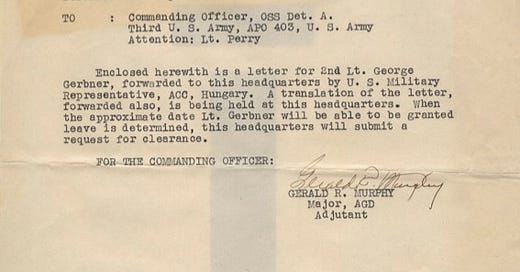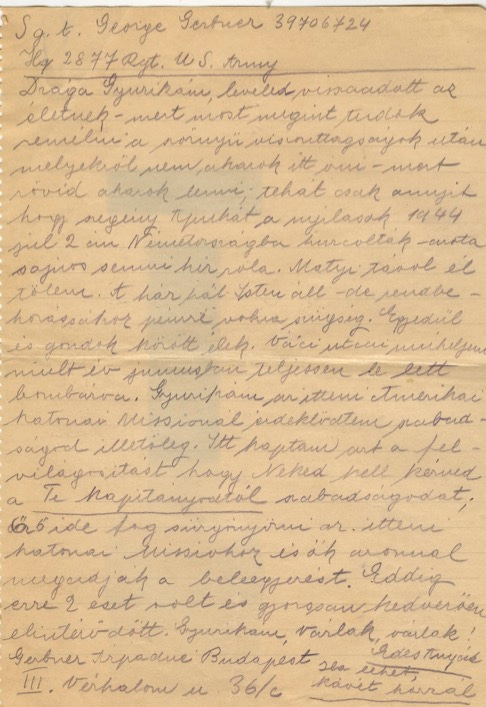Today, I interrupt my description of Hungarian war criminals to share a heartbreaking letter I found in Opapa’s files last week.
The letter, handwritten in Hungarian, is not dated. But it is signed Gerbner Árpádné — the “ne” at the end of Arpad signals that it is from Arpad Gerbner’s wife — Opapa’s mother, Margit Muranyi.
The letter was accompanied by a typewritten letter in English which does give a date: July 17, 1945.
From the English letter, I know that Margit, Opapa’s mother, sent this letter through the US military mission in Hungary. So she must have written it after the war was over — in May, June or July 1945.
When I first saw this letter, I wondered whether it might answer some of my longstanding questions about when Opapa learned about his father’s fate: was it in 1944, soon after his father disappeared? Was it when he arrived in Budapest to deliver the Hungarian war criminals to trial? Did he know about his father’s disappearance when he arrested Béla Imrédy in May 1945? I felt that this letter, written by his mother in 1945, would probably offer some insight.
I sent the letter to a professional translator last week, and received the translation this morning.
Here is what Margit wrote:
My dear Gyurika,
Your letter brought me back to life – as now I can be hopeful again after all the terrible happenings. I do not want to write about those, as I want to be short. So, I only want to say that on July 2, 1944, the members of the Arrow Cross Party dragged away poor Apuka to Germany and we have not heard about him ever since.
Matyi lives far from me. The house, thank God, is still standing, but money would be needed to renovate it. I live by myself, with a lot of difficulties. My workplace at Váci street was completely bombed last June.
My Gyurika, I have asked about your days off at the military mission here. They have informed me that You need to request your days off from Your captain, and he will send a telegraph to the military mission here and they will approve it immediately. It has happened twice before, and it was arranged quickly.
My Gyurika, I am waiting, waiting for you!
Your Mother
If possible, bring coffee!
Gerbner Árpádné, Budapest,
III. Várhalom u. 36/c
“Apuka” is the Hungarian word for “Daddy” and as my translator explained, “about 80-100 years ago this word expressed both love and respect toward the father of the family. It was a common expression mainly in middle class families.”
In this letter, we learn that “Apuka” — Opapa’s beloved father — was “dragged away” by “members of the Arrow Cross Party” on “July 2, 1944.” Margit thinks he has been taken to Germany, but they “have not heard from him since.”
This was the letter that informed Opapa, for the first time, that his father was missing. Margit also gives a date for Arpad’s disappearance: July 2, 1944. This is new information, and it is different from the official date recording Arpad’s death, which was August 15, 1944. Was Arpad in custody for six weeks before he was killed? Or is one of those dates wrong? It’s hard to contemplate either option.
Margit’s letter brings the heartbreak of the war back to life. The news is all bad: so bad that Margit does “not want to write about [it].” Despite this, in addition to Árpád’s disappearance, we also learn that Margit’s workplace has been bombed, her son Matyi lives “far away,” and that while her house is “still standing,” it needs work and she lived by herself, “with a lot of difficulties.” She also needs coffee.
Where was Opapa when he read this?
Probably in Italy, in Trieste or Duino. On July 17, 1945, Opapa had either left, or was about to leave, for his secret mission to Slovenia. He may have been in a Slovenian jail when it arrived in the American headquarters. Most likely, he read the letter when he returned from Slovenia, sometime around July 23, 1945.
So when he learned about his father’s disappearance, Opapa had already arrested Béla Imrédy and the other war criminals, but had not yet extradited them back to Budapest.
The war was over, but its horrors continued to surface.






“If possible, bring coffee” is very relatable 😅